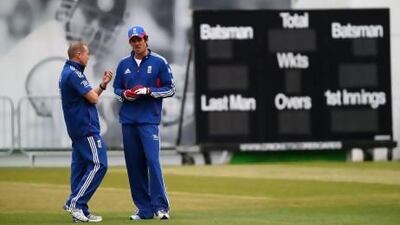As a cricketing nation, nothing says you are not wanted, or not hugely popular, or pretty unimportant, like being the first tourists of an English summer.
OK, so these days an invitation from the Board of Control for Cricket in India (BCCI) is way more prestigious, and a snub far more damaging.
But the Indian board in any case only seem to arrange all bilateral series grudgingly, as if they were inconveniences to endure until they arrive each year at their actual raison d'être: to play among themselves, or, as they also call it, the Indian Premier League.
But the BCCI's power means it is not really part of cricket's fraternity; they are the blimp floating unconcerned above it that everyone wants to jump into.
Touring England as the season's opening act? That is as tight a slap as you can have to be reminded of shrinking status in world cricket.
It is the series everyone wishes out of the way as swiftly as possible, and if that sounds too harsh, breeze through this list of England's first opponents every summer since the last time they had just one summer opponent, in 1999: Zimbabwe, Pakistan, Sri Lanka, Zimbabwe, New Zealand, Bangladesh, Sri Lanka, West Indies, New Zealand, West Indies, Bangladesh, Sri Lanka, West Indies.
Only Pakistan in 2006 and 2010, and West Indies in 2004, have also subsequently graduated to be main courses over a summer, thanks in part to a vast fan base in England.
Since the turn of the century, English summers have increasingly begun to feel like a weird, uncomfortable conjoining of old-school philanthropy and wanting to do right by the cricket world, with a crasser new age commercialism.
So, out of a sense of duty, all teams are invited, even Bangladesh and Zimbabwe, who have toured twice each since 2000.
In 2010, they even offered Pakistan a home for a series against Australia, though the Pakistan Cricket Board ensured that would not extend to a longer-term arrangement.
But there have also been enough big banner series and, significantly, enough global limited-overs tournaments (2004 Champions Trophy, 2009 World Twenty20 and the last Champions Trophy this summer), as well as plenty of ODI tri-series, to keep the banks happy.
This summer, which officially begins tomorrow with the first of two Tests against New Zealand at Lord's, is no different.
Sandwiched between the sound and fury of the Indian Premier League and the sound and fury of the Ashes, cricket is telling us how irrelevant the Kiwis have quietly become.
They have not been the principal opponents in an English summer since 1999, when they won a four-Test event, their last series win in England, and was a peak in their last prolonged jig among the strongest Test nations in the world.
This series will pass even quicker, given that the rest of the world is waiting for the Champions Trophy to start.
But that could mean missing out on what could be a rare intriguing first series.
More often than not, England will romp through their first opponents, the visitors always somehow too cold and stiff and unused to an English May.
Only Sri Lanka in 2006 and Pakistan in 2001 come to mind as providing a more compelling and competitive appetiser than the late-summer series.
Normally, you would say England should win this as well, but that would discount the fact that neither side has had "a normal" for some time now.
New Zealand have rumbled through bizarre administrative upheavals, managing to win Tests in Australia and Sri Lanka with a group of players far less gilded than previous generations.
England appear contractually obliged to take one step back each time they move forward.
The clean sweep at the hands of Pakistan last year in the UAE as the top-ranked Test side was jarring. After recovering some ground by winning in India last winter, a drawn series in New Zealand earlier this year was difficult to grasp, especially because they should have lost.
Both sides have good pace attacks at opposite ends of their development scale. Brendon McCullum and Alastair Cook offer pleasant contrasts as captains and even without the injured Kevin Pietersen, there are able batsmen on both sides.
It should be a contest, but as Stuart Broad pointed out in an interview recently, everybody is already talking about something else.
The prospect of winning four consecutive Ashes series, or a first-ever global 50-over title.
Follow us

